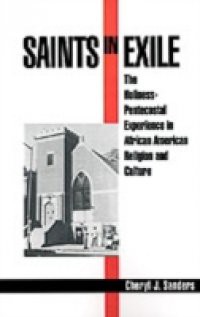Saints in Exile studies, from an insiders perspective, the worship practices and social ethics of the African American family of Holiness, Pentecostal, and Apostolic churches known collectively as the Sanctified Church. Cheryl Sanders identifies the theme of exile, both as an idea and an experience, as the key to understanding the dialectical nature of African American religious and intellectual life, that W.E.B. Du Bois called double-conscious. Sanderss saints in exile are a people who see themselves as in the world but not of it; their marginalized status is both self-imposed and involuntary, a consequence of racism, sexism and other forms of elitism. When joined with the biblical tropes of homecoming and reconciliation, the concept of exile serves as a vital vantage point from which to identify, critique, and remedy the continued alienation of blacks, women, and the poor in the United States. Sanderss interpretive approach clarifies many paradoxical features of black existence, especially the peculiar interplay of the sacred and the secular in African American song, speech, and dance. She particularly scrutinizes gospel music, a product of the Sanctified worship tradition that has had a significant influence on popular culture. Saints in Exile goes further than any previous study in illuminating the African American experience; it will be welcomed by scholars and students of American religion, African American studies, and American History.

